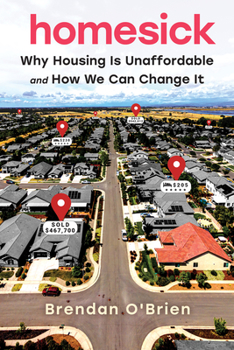Homesick: Why Housing Is Unaffordable and How We Can Change It
Nobody who sits in traffic on Sedona, Arizona's main stretch or stands shoulder-to-shoulder in its many souvenir shops would call it a ghost town.
Neither would anyone renting a room for $2,000 a month or buying a house for a half-million dollars. And yet, the people who built the small town and made it a community are being pushed further and further out. Their home is being sold out from under their feet.
In studying the impact of short-term rentals, Brendan O'Brien saw something similar happening in places ranging from Bend, Oregon, to Bar Harbor, Maine. But it isn't just short-term rentals, and it's not just tourism towns. Neighborhoods in Austin and Atlanta have become rows of investment properties. Longtime residents in Spokane and Boston have been replaced by new, high-salaried remote workers. Across the country, a level of unaffordable housing which once seemed unique to global cities like New York and San Francisco has become the norm, with nearly a third of all US households considered housing cost-burdened.
This situation has been aided by the direct actions of developers, politicians, and existing homeowners who have sought to drive up the cost of housing. But it's mostly happened due to a societal-wide refusal to see housing as anything more than real estate, another product available to the highest bidder. This trend of putting local housing on a global market has worsened in recent years but is nothing new. Housing in the United States has always been marred by racial and income inequality that mocks the country's highest ideals.
Deeply researched and deeply felt, Homesick argues that we can be so much better. And we can start where we live.
Neither would anyone renting a room for $2,000 a month or buying a house for a half-million dollars. And yet, the people who built the small town and made it a community are being pushed further and further out. Their home is being sold out from under their feet.
In studying the impact of short-term rentals, Brendan O'Brien saw something similar happening in places ranging from Bend, Oregon, to Bar Harbor, Maine. But it isn't just short-term rentals, and it's not just tourism towns. Neighborhoods in Austin and Atlanta have become rows of investment properties. Longtime residents in Spokane and Boston have been replaced by new, high-salaried remote workers. Across the country, a level of unaffordable housing which once seemed unique to global cities like New York and San Francisco has become the norm, with nearly a third of all US households considered housing cost-burdened.
This situation has been aided by the direct actions of developers, politicians, and existing homeowners who have sought to drive up the cost of housing. But it's mostly happened due to a societal-wide refusal to see housing as anything more than real estate, another product available to the highest bidder. This trend of putting local housing on a global market has worsened in recent years but is nothing new. Housing in the United States has always been marred by racial and income inequality that mocks the country's highest ideals.
Deeply researched and deeply felt, Homesick argues that we can be so much better. And we can start where we live.
Format:Paperback
Language:English
ISBN:1641609699
ISBN13:9781641609692
Release Date:September 2023
Publisher:Chicago Review Press
Length:336 Pages
Weight:1.24 lbs.
Dimensions:0.9" x 6.3" x 9.1"
Customer Reviews
0 rating





